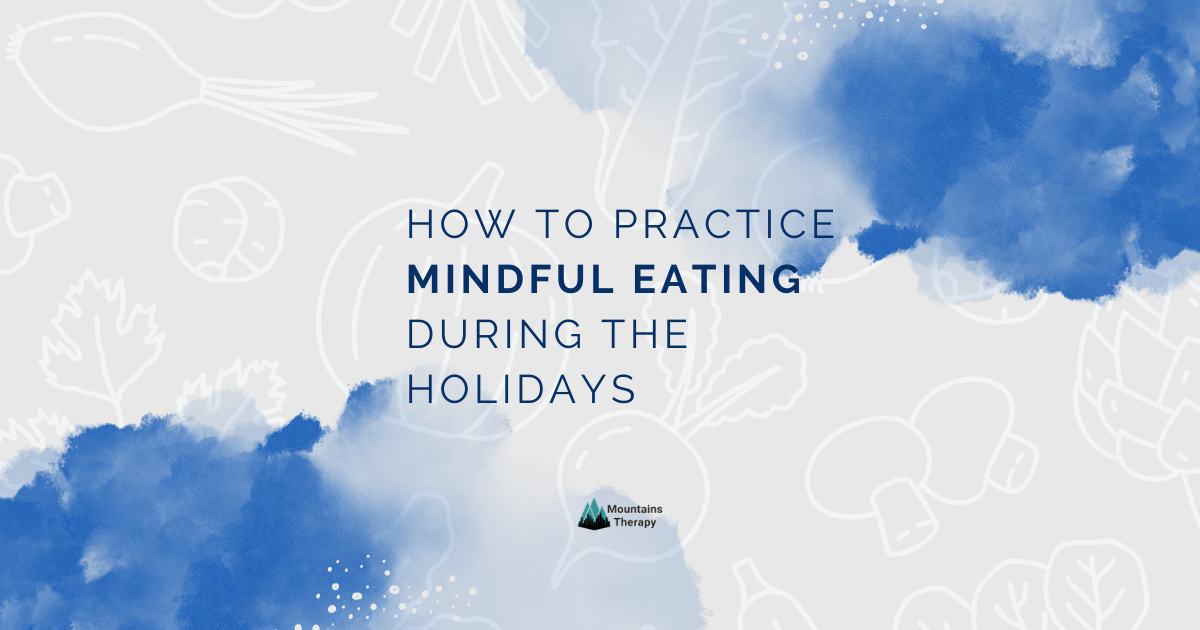How to Practice Mindful Eating During the Holidays
Learn more about Individual Therapy here.
The holidays can be joyful, but they also bring challenges—especially around food, weight, and body image. At Mountains Therapy, we therapists work with individuals facing a wide range of concerns, including binge eating, emotional eating, disordered eating patterns, body dysmorphia, and weight concerns. Whether you’re navigating eating issues, societal pressures, or the emotional complexities of family gatherings, these tips can help you embrace the season with kindness toward yourself.
Tips for Mindful Eating During the Holidays
1. Emotional Eating
Acknowledge your feelings and give them space.
The holidays can stir up stress, loneliness, or grief, and it’s natural to seek comfort. Before turning to food, pause and identify what emotion you’re experiencing. Practicing mindfulness or journaling about your feelings can help. If you decide to eat, let it be an intentional act of self-care, not self-punishment. Therapy can help explore underlying emotions tied to emotional eating.
2. Body Dysmorphia
Focus on experiences, not appearances.
Holiday gatherings and photos often bring unwanted attention to appearance. If you feel triggered, shift your focus to meaningful connections and memories. Practice affirmations like, “I am valued for who I am, not how I look.” Therapists specializing in body image issues can help reframe negative self-perceptions.
3. Binge Eating
Practice gentle curiosity, not criticism.
If you find yourself overeating, avoid judgment. Instead, ask yourself: Was I overly hungry, overwhelmed, or feeling out of control? Reflecting with self-compassion can help break the cycle of guilt and shame associated with binge eating disorder or other eating disorders.
4. Chronic Dieting
Allow yourself to enjoy food without guilt.
The holidays are a time to savor favorite dishes and traditions. Instead of labeling foods as “good” or “bad,” focus on how they make you feel. Permission to enjoy holiday meals can reduce the cycle of restriction and overeating, a common pattern in disordered eating.
5. Low Self-Esteem Related to Body Image
Celebrate your body for what it allows you to do.
Your body supports you in creating memories, connecting with loved ones, and experiencing life. Shifting the focus from appearance to gratitude can help combat the negative self-talk often tied to body image concerns and weight issues.
6. Societal Pressure to Conform to Beauty Standards
Challenge harmful narratives.
The holidays often amplify messages about the “perfect holiday body.” Remind yourself that beauty standards are subjective and not reflective of your worth. Surround yourself with positive influences, such as body-positive media or communities.
7. Trauma Related to Food or Body Image
Create a safe and supportive environment for meals.
Trauma related to food or body image can resurface during the holidays. Plan meals in ways that feel comfortable for you, and set boundaries with people who may unintentionally trigger painful memories. Therapy can help process and heal these experiences.
8. Impact of Social Media on Body Perception
Take a break from comparison.
Social media often portrays unrealistic ideals, especially during the holidays. Give yourself permission to step away from platforms that don’t serve your well-being. Instead, focus on real-life moments that bring joy and connection.
9. Anxiety Around Intuitive Eating
Trust your body’s signals, one meal at a time.
If intuitive eating feels challenging, start small by noticing your hunger and fullness cues. Approach meals without distractions and focus on how your body feels. Working with a therapist can help ease the anxiety and develop trust in your body’s wisdom.
10. Stress Around Weight Concerns
Redirect your focus to meaningful connections.
The holidays are about more than physical appearance. Remind yourself that your value lies in who you are, not how much you weigh. Spending time with loved ones and engaging in traditions can create a more fulfilling experience.
How Mountains Therapy Can Support - You are not alone!
At Mountains Therapy, our individual therapists and counselors, work with clients to address challenges like binge eating disorder, emotional eating, chronic dieting, and trauma tied to food or body image. We also support individuals struggling with low self-esteem, the impacts of social media on body perception, and anxiety related to eating habits. Whether you’re working through disordered eating patterns, building a healthier relationship with food, or redefining your self-worth, therapy offers a safe and supportive space to grow.











